I’ve always been uncomfortable talking to people I don’t know well.
But over the years, I’ve learned exactly what to do whenever I find myself thinking, “I don’t know what to say.”
First of all: If you’re wondering, “Is it normal to have nothing to talk about?” the answer is “YES!” I used to have similar worries, and I believed there was something wrong with me.
It turned out that I simply needed to learn some strategies to deal with those moments when my mind goes blank. You see, social skills aren’t something we’re born with. They’re just that: skills. They can be practiced and improved.
Here are my tricks for how to know what to say, even when you don’t know what to say.
1. Memorize some universal questions
“I don’t know what to do after I say hello. What do I say to open a conversation?”
When you’ve just met someone, you need to make small talk. Think of small talk as a warm-up exercise that paves the way for more interesting discussions later on. But how do you start a conversation?
These are the questions I always have in the back of my head, ready to go whenever I need something to say. (Just knowing they are there as a safety net makes me feel more relaxed.)
Don’t fire them off all at once. Use them when a topic dies out.
The questions:
- “How do you know the other people here?”
- “Where are you from?”
- “What brings you here?”
- “What do you do?”
(See my guide on how to start a conversation for more opening lines and advice on how to have more to say when chatting to new people.)
These questions are open, meaning that they encourage the other person to give a more in-depth answer than “Yes” or “No.”
Be careful not to flood the other person with questions. You don’t want to interrogate them. It’s important that you share an equal amount of information about yourself. This leads me to the next tip.
2. Switch between sharing and asking questions
“Why don’t I know what to say after someone replies to my questions? It’s hard for me to keep a conversation flowing without feeling as though I’m interrogating the other person.”
Ever come across someone who constantly asks questions? Annoying.
Or someone who NEVER asks questions? Self-absorbed.
For years, I wondered how to find a balance between talking about myself and asking questions.
We don’t want to constantly ask questions, nor do we want to constantly talk about ourselves. The IFR method is all about finding that balance. Here it is:
Inquire: Ask a sincere question.
Follow up: Ask a follow-up question.
Relate: Share something about yourself that relates to what the other person just said.
You can then repeat the sequence to keep the conversation going.
Here’s an example. The other day, I was talking to someone who turned out to be a filmmaker. Here’s how the conversation went:
Inquire: What kind of documentaries do you make?
She: Right now, I’m doing a movie on bodegas in New York City.
Follow up: Oh, interesting. What’s your takeaway so far?
She: That almost all bodegas seem to have cats!
Relate: Haha, I’ve noticed that. The one next to where I live has a cat who always sits on the counter.
And then I inquired again, repeating the IFR sequence:
Inquire: Are you a cat person?
Try to make the conversation go back and forth like that. The pattern goes like this: they talk a bit about themselves, we talk about ourselves, then we let them talk again, and so on.
Notice that when you use the IFR method, it’s easier to come up with things to say.
- If you find yourself thinking, “I don’t know what to say” after you’ve asked someone a question, follow up on what you just asked.
- If you don’t know what to say after you’ve asked a follow-up question, say something related to what you just asked.
- If you don’t know what to say when you’ve related to someone’s answer, inquire about what you’ve just said.
3. Focus all your attention on the conversation
“I don’t know what to say in conversations because I get so worried about what the other person is thinking of me. How do you think of something to say when you’re in this situation?”
When therapists work with shy people, people with social anxiety, and others who completely lock up in conversations, they use a technique called Shift of Attentional Focus. They instruct their clients to focus all their attention on the conversation they’re having, rather than thinking about how they come across and what they should say next.[1]
(It’s hard, especially in the beginning, but gets surprisingly easy with some practice.)
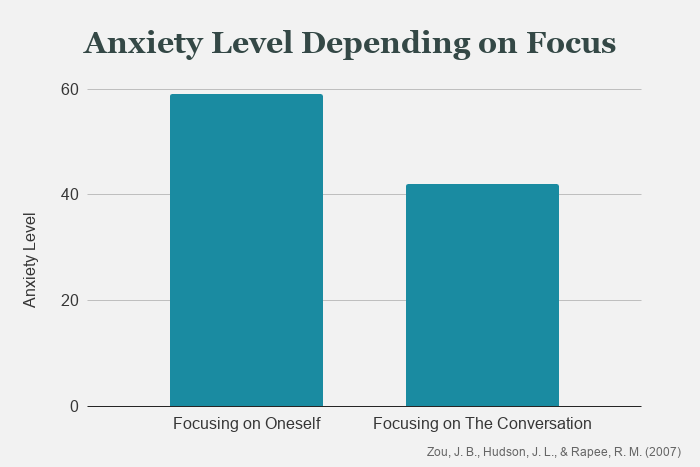
Participants who focused on the conversation rather than themselves felt less anxious.[2]
Here’s how to do this in practice:
Say that you ask someone how their week was. They reply, “I went to Paris with my friends last weekend. It was great!”
Here’s what I would have thought before I learned about this method:
“Oh, she’s been to Paris! I’ve never been there. She’ll probably think I’m boring. Should I tell her about that time I went to Thailand? No, that’s stupid. I DON’T KNOW WHAT TO SAY!”
And so on.
But if you use the Shift of Attentional Focus technique, you constantly move your thoughts back to the conversation.
Let’s REALLY focus on what she just said. What questions might we come up with to move the conversation forward?
- What was Paris like?
- How long was she there?
- Is she jet-lagged?
- How many friends did she go with?
You don’t have to fire off all these questions. The idea is to give the other person your full attention and let your natural curiosity come up with things to ask. You can then choose which questions would be most suitable for the conversation.
Reread her reply above and see if you can come up with even more questions.
4. Keep the conversation centered on the other person
Another thing you can do to come up with things to say is to stop trying to come up with conversation topics. I know this sounds weird, so let me show you what I mean.
Of course, if you’re already feeling nervous, it might not be so easy to just “relax and stop worrying about it.” But there’s a trick that you can try.
Shift the conversation over to the other person by asking sincere questions. This keeps the conversations going, and as it moves forward, you can throw in small facts about yourself that you feel comfortable sharing.
For example, if the topic of work comes up, you can ask basic questions like:
- “Is your work stressful?”
- “How well do you like your job?”
- “What exactly do you do at your job?”
- “What do you want to be doing in 5 years?”
- “Is the company good to work for?”
- “Why did you pick that career?”
These Why, What, How questions can be used in a conversation about any topic. Break up the questions by sharing a little bit about yourself every now and then, as I described in the IFR method section.
Here’s our guide for how to have a conversation without asking too many questions.
5. Jump back to a previous topic
“I don’t know how to respond when a conversation starts drying up. It feels really awkward and embarrassing. How do you talk when you have nothing to say?”
One of my favorite methods to know what to say is Conversational Threading. It’s not only helpful for continuing your conversations but also makes them more dynamic.
In short, Conversational Threading relies on the fact that your interactions don’t have to be linear.
For example, if you’ve exhausted the current topic, you can always jump back to something you’ve talked about earlier.
If your friend mentioned that they saw a movie last weekend, and then the conversation moves on to, say, work, and then the work topic dies out, you can say:
“By the way, you said that you saw a movie last weekend, was it good?”
Here’s a video that explains conversational threading with a real-world conversation:
6. View silence in conversations as something good
Often, I didn’t know what to say because:
- There was a silence in the conversation.
- I panicked and froze up.
- I couldn’t come up with anything to say because I was nervous.
My friend, a coach and behavioral scientist, made me realize something powerful: Silence is not necessarily awkward.
I used to think that periods of silence in a conversation was always my fault and that I had to “fix it” somehow.
In reality, most conversations contain some silences or long pauses. We tend to interpret that silence as a negative sign, but it doesn’t mean the conversation is going badly. Rather than assuming the worst, use the moment to catch your breath and move forward from there.
A silence isn’t awkward until you start stressing out about it.
If you come off as relaxed about silences during a conversation, people around you will follow your lead. When you feel more relaxed, it’s easier to come up with the next thing to say.
Besides, it’s important to know that there can be many reasons for a break in a conversation.
Reasons like:
- The other person is nervous too.
- The conversation would benefit from a silent moment in which you can both breathe before carrying on.
- One of you is having an off day and doesn’t feel like talking much, which is okay!
Remember this: As two people get to know each other, they are more comfortable sharing moments of silence.
LESSON LEARNED: Practice being comfortable with silence rather than trying to eliminate it. It takes the pressure off you and makes knowing what to say easier.
7. Challenge your inner critical voice
“I’m quiet because I don’t know what to say. It feels like everyone else is so much more socially skilled than me.”
Being a self-conscious introvert, I would often exaggerate and overdramatize social situations in my head.
I’d feel like people were judging me for “failing at having a good conversation” whenever I’d say something “stupid.” Sure, people do judge us based on what we say, as well as how we say it. But they probably don’t judge us half as harshly as we judge ourselves.
So don’t get stuck thinking about that one wrong thing you’ve said five minutes ago because even if the other person did notice it, they probably didn’t think anything of it.
In reality, most of our blunders go by completely unnoticed by others because they are often just as nervous and worried as we are about how they come across.
Changing your self-talk can make you more confident and believe more in yourself.
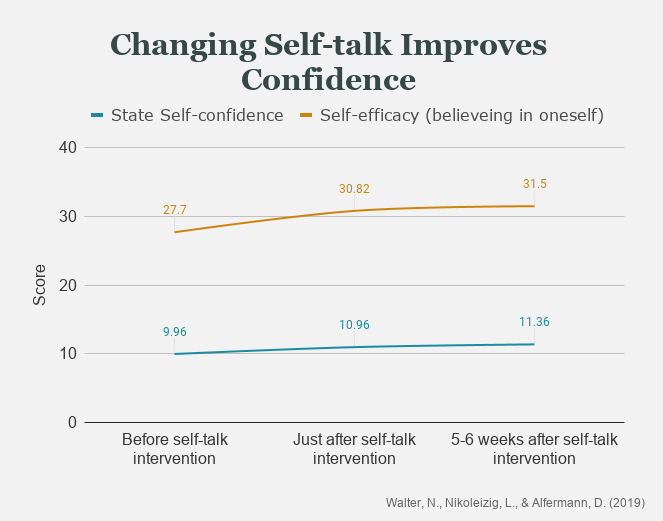
People who went through training aimed at changing the way they talked to themselves started believing more in themselves.[3]
Practice being realistic by doing the following:
- Every day, remind yourself that everyone gets nervous. We all have moments when our negative thoughts take over, like “Argh, I can’t talk to people!” or “Why do I feel like I have nothing to say?”
- Remind yourself that people care as little about your hiccups as you care about theirs.
- Remember that just because you think that people will judge you negatively doesn’t mean that they will.
- Realize that if you are naturally quiet, that’s fine. Being quiet is a normal personality trait, and there’s no need to force yourself to be more outgoing. However, if you want to learn how to be more talkative, read this guide on how to stop being quiet.
Identifying and challenging your inner critical voice can be really tricky on your own. Many therapists are experts at helping you identify and overcome your inner critic.
We recommend BetterHelp for online therapy, since they offer unlimited messaging and a weekly session, and are cheaper than going to a therapist's office.
Their plans start at $64 per week. If you use this link, you get 20% off your first month at BetterHelp + a $50 coupon valid for any SocialSelf course: Click here to learn more about BetterHelp.
(To receive your $50 SocialSelf coupon, sign up with our link. Then, email BetterHelp’s order confirmation to us to receive your personal code. You can use this code for any of our courses.)
8. Know that it’s OK to make obvious statements
If you’ve ever wondered, “How do you hold a good conversation?” you might have thought, “By making other people think I’m really fascinating and witty!” But when I made friends with socially skilled people, they taught me something fundamental about what to say:
What you say doesn’t need to be thoughtful, interesting, or make you appear smart.
Why?
When people hang out with you, they usually want to have a good time. They want to relax and enjoy themselves. People DON’T want a constant stream of thought-provoking clever remarks. If you attempt to sound smart all the time, they may think you are a try-hard or simply annoying.
Often, small talk is just fine. Have you EVER judged someone for saying something too simple? I’m guessing not. So why would anyone judge you?
Stop trying to say smart things all the time. (You can say smart things when they naturally pop into your head, but you don’t need to force them.)
My friend Andreas, for example, is great in social settings. He’s also a member of Mensa with an IQ of 145. When he talks to people, he says things like:
- “I love the weather right now.”
- “Look at the tree over there, it’s so nice.”
- “That car looks cool!”
He doesn’t come off as smart for saying smart things, but for being socially savvy.
LESSON LEARNED: When you stop trying to say smart things, it’s easier to know what to say because you take the pressure off yourself. Say what you want to say, and don’t filter yourself too much.
9. Comment on something around you
If you want to know how to always have something to talk about, simply look around you!
Looking around my workplace right now, I can see a bunch of stuff that could inspire statements, which in turn could start a conversation.
For example:
- “I like those plants.”
- “This is nice music. What band is it?”
- “I like that painting.”
Here’s an exercise you can do right now: Look around you. What can you see? What kind of statements could you make to get a conversation started?
10. Ask follow-up questions
Dare to dig deeper into topics you find interesting. Don’t be afraid to move beyond surface-level questions. (Make sure you share something about yourself in between the questions so that the other person doesn’t think you’re a spy.)
How do you know when to dig in? By listening carefully!
Here are some signs you should go beyond surface-level questions and dig more deeply:
- The other person keeps subtly steering the conversation back to the topic.
- You feel a genuine desire to learn more about the topic.
- You know that asking questions about the topic would lead to a conversation that involves sharing feelings or opinions.
Let’s say that someone told you that they work as a golf trainer.
You can dig deeper by asking:
- “What’s it like to work as a golf trainer?”
- “What type of clients do you have?”
- “What made you decide to be a golf trainer in the first place?”
Naturally, you would take a break between questions to share something about yourself.
Digging deeper also helps you uncover commonalities. Talking about what you have in common will make the conversation more enjoyable for both of you.
11. Give simple, sincere responses when someone shares a sad story or upsetting news
No guide can tell you how to always know what to say in every type of difficult conversation.
However, it helps to stay calm, show empathy, listen carefully, and offer emotional support if it’s appropriate.
For example, if someone tells you that a close relative has died, you could say:
- “It sounds like you’ve been through a terrible time.”
- “I’m so sorry. It’s really hard to lose a loved one.”
If you know the other person well, you can add, “I’m here to listen if you want to talk.”
Make sure your body language matches your words. Maintaining eye contact, nodding slightly, and speaking in a steady tone of voice signals that you care about the other person.
Do not make trivializing comments like “Everything happens for a reason,” because you will come across as insensitive.
It’s OK to say, “I just need a moment to process that” if their news is particularly shocking.
12. Remember “F.O.R.D.” when you run out of things to say
F.O.R.D. stands for:
- Family
- Occupation
- Recreation
- Dreams
This acronym is useful because these topics are relevant to everyone. Even if someone doesn’t have a job or hobbies, you can ask them what they’d like to do.
You can start with a couple of simple, fact-based questions and then dig deeper to learn more about the person you’re talking to.
For example:
- “What do you do for a living?” is a surface-level “Occupation” question.
- “What’s your favorite part of your job?” is slightly more meaningful and encourages them to provide more details.
- “It sounds like you’ve had a great career so far. Is it everything you hoped it would be?” is much more personal and could move the conversation to a discussion about hopes and dreams.
13. Do some background research before going to a social event
Thinking of questions and conversation topics in advance of a social occasion can make it much easier to know what to say.
For example, let’s say that you have a friend who works for an architecture firm. They have invited you to dinner, along with two of their architect colleagues who you have never met before.
It’s very likely that these two people will be happy to talk about design, architecture, buildings, and art in general. With this in mind, you could prepare questions like:
- “Who’s your biggest design inspiration?”
- “What city do you think has the best architecture?”
- “I’m taking a trip to Italy next year. Which buildings should I make time to see?”
Memorizing a few questions can make the conversation a lot smoother.
14. Try the echo technique when a conversation starts to flag and you don’t know what to say
Even if someone is giving you very short, minimal answers, there’s a quick trick you can use to keep the conversation alive.
Try this: Simply repeat the last part of their response using an inquisitive tone of voice.
Example:
You: “What was the best part of your vacation?”
Them: “Probably when I went scuba diving.”
You: “Cool. Do you go diving a lot, or was it a new experience?”
Them: “It was kind of a new experience, but also not.”
You [Echoing]: “Also not?”
Them: “Yeah well, I mean I did try diving once a long time ago, but it hardly counted because I only spent 10 minutes in the water. What happened was…”
The great thing about this method is that you don’t even have to think of a new question. They have already given you every word you need. However, don’t use this trick too often, or you will come off as annoying.
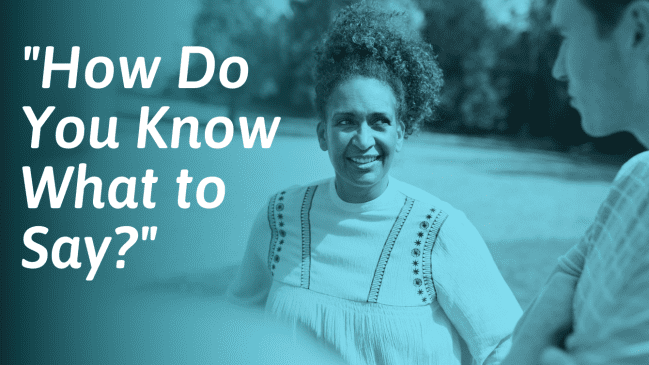
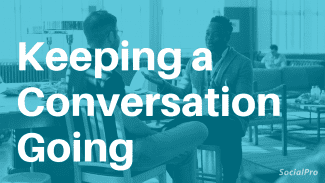



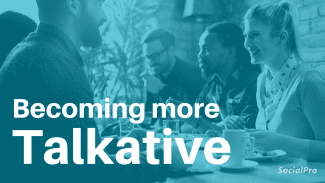
Really like this techniques, lots of useful tips in there! I read recently about how the British Royal family often use the echo technique when speaking to members of the public to build rapport and show interest in what guests want to talk about. Obviously works well for them so a good tip to keep in mind!
My big issue is trying to care about what the other person is saying. Honestly, I’m the only person on the planet I care about and I really just don’t want to hear what other people say. My total lack of care for what other people say has resulted in me walking away in the middle of somebody else’s sentence pretty much every time I’m forced to talk to strangers in public. And I didn’t even realize they were talking until they got upset with me for walking away in the middle of a sentence.
Sounds narcissistic. Be feeling the same way but it’s rude. Especially if you’re interested in the person. Try imagining people as customers and you need commissions.
interesting and I would like to be less talkative, speak less or not to speak at all most of the time. thank you
what to do if the other person is introverted
I really love this article and gave it to one of the members of a community I lead to help her learn to actually reciprocate in conversation. Is there a way to view this site without all the ads? They really distract from the really brilliant message you share and I Think it would be worth a membership or something if I could get it ad free.
and if you have to talk to them everyday OR every week then you are DOOMED!!
the intro conversations, the greetings are easy. After that you go blank then you are DOOMED!!
That can be so tough! Maybe this guide we wrote can help you, on how to keep the conversation going: https://socialself.com/blog/the-5-best-ways-to-keep-a-conversation-going/